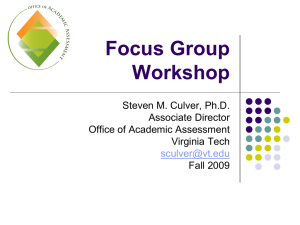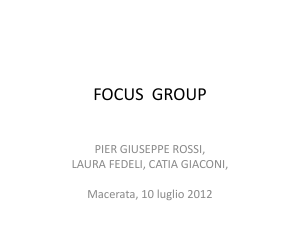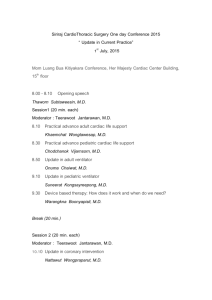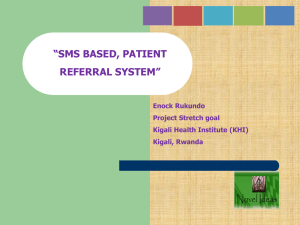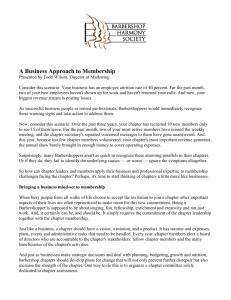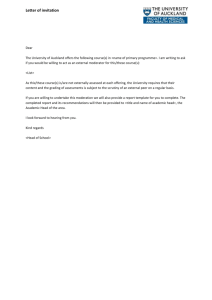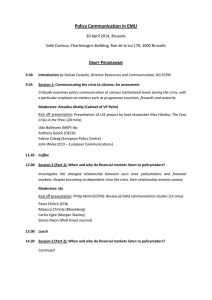here - Zero Project
advertisement
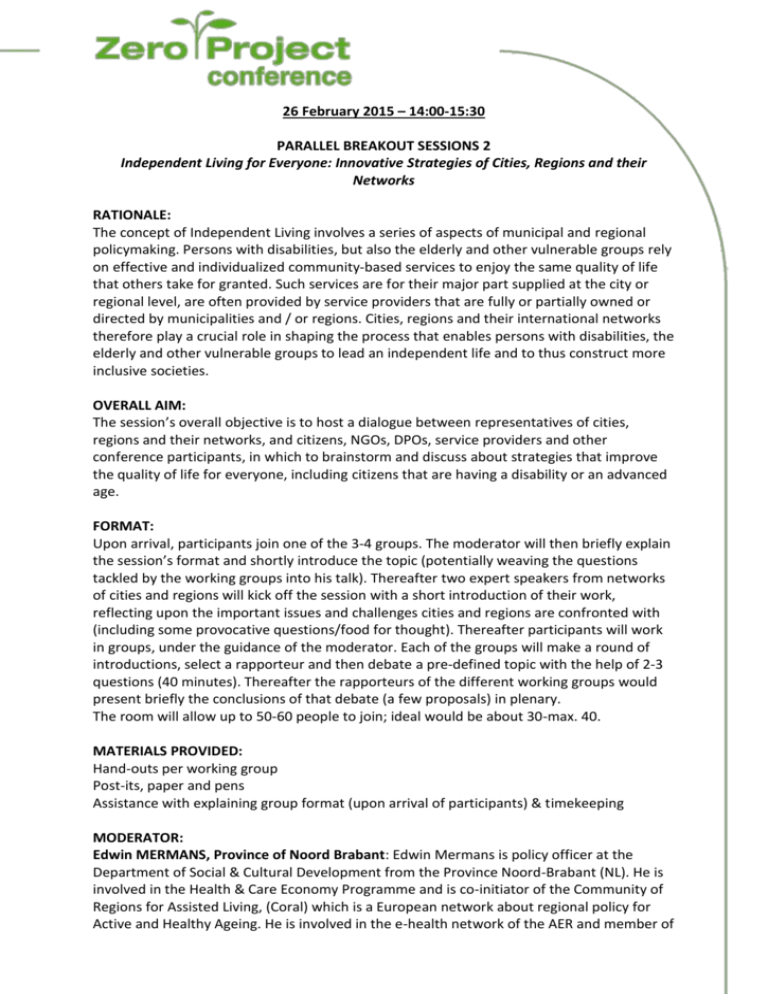
26 February 2015 – 14:00-15:30 PARALLEL BREAKOUT SESSIONS 2 Independent Living for Everyone: Innovative Strategies of Cities, Regions and their Networks RATIONALE: The concept of Independent Living involves a series of aspects of municipal and regional policymaking. Persons with disabilities, but also the elderly and other vulnerable groups rely on effective and individualized community-based services to enjoy the same quality of life that others take for granted. Such services are for their major part supplied at the city or regional level, are often provided by service providers that are fully or partially owned or directed by municipalities and / or regions. Cities, regions and their international networks therefore play a crucial role in shaping the process that enables persons with disabilities, the elderly and other vulnerable groups to lead an independent life and to thus construct more inclusive societies. OVERALL AIM: The session’s overall objective is to host a dialogue between representatives of cities, regions and their networks, and citizens, NGOs, DPOs, service providers and other conference participants, in which to brainstorm and discuss about strategies that improve the quality of life for everyone, including citizens that are having a disability or an advanced age. FORMAT: Upon arrival, participants join one of the 3-4 groups. The moderator will then briefly explain the session’s format and shortly introduce the topic (potentially weaving the questions tackled by the working groups into his talk). Thereafter two expert speakers from networks of cities and regions will kick off the session with a short introduction of their work, reflecting upon the important issues and challenges cities and regions are confronted with (including some provocative questions/food for thought). Thereafter participants will work in groups, under the guidance of the moderator. Each of the groups will make a round of introductions, select a rapporteur and then debate a pre-defined topic with the help of 2-3 questions (40 minutes). Thereafter the rapporteurs of the different working groups would present briefly the conclusions of that debate (a few proposals) in plenary. The room will allow up to 50-60 people to join; ideal would be about 30-max. 40. MATERIALS PROVIDED: Hand-outs per working group Post-its, paper and pens Assistance with explaining group format (upon arrival of participants) & timekeeping MODERATOR: Edwin MERMANS, Province of Noord Brabant: Edwin Mermans is policy officer at the Department of Social & Cultural Development from the Province Noord-Brabant (NL). He is involved in the Health & Care Economy Programme and is co-initiator of the Community of Regions for Assisted Living, (Coral) which is a European network about regional policy for Active and Healthy Ageing. He is involved in the e-health network of the AER and member of Action Group Independent Living from the European Innovation Partnership on Active and Healthy Ageing. EXPERT STATEMENTS: Johanna PACEVICIUS, Assembly of European Regions (AER): The Assembly of European Regions (AER) is the largest independent network of regional authorities in wider Europe, bringing together regions from 35 countries. Since 2010, Johanna Pacevicius has been facilitating strategic information, tools and connections for regional stakeholders and managing European projects. She leads the work of the AER Social Policy and Public Health Committee, which focuses on innovation in the public sector, ICT for inclusive societies and social entrepreneurship. Elena CURTOPASSI, Veneto Region, European Network for Social Authorities (ENSA) and European Local Inclusion and Social Action Network (ELISAN): Elena Curtopassi has a 16 years’ experience in regional policies, working for the Veneto Region Brussels Office in charge of Social, International Affairs and EU policies. She steers two European networks: the ENSA - European Network for Social Authorities, a network of cities and European Regions that aims to promote international cooperation in the social field, and the ELISAN European Local Inclusion and Social Action Network which aims to speak up for local and regional representatives responsible for social action in Europe. DETAILED AGENDA: 14h00 Welcome and introduction by moderator 14h05 Expert statement by Johanna Pacevicius, AER 14h10 Expert statement Elena Curtopassi, Veneto Region, European Network for Social Authorities (ENSA) and European Local Inclusion and Social Action Network (ELISAN) 14h15 Split into 3 working groups led by the moderators above and guided by pre-defined questions – Working Groups: Working group 1: Innovating through end user involvement: Advantages and challenges with its implementation Moderator: Johanna PACEVICIUS, Assembly of European Regions - How are end users best involved in the organization of services they need? - What are the approaches that have a proven track record of success? - Which challenges remain for policy makers? And for users? - Based on your experience, how can civil society, the private sector and universities better collaborate with regional government to ensure that participation goes further than mere consultations? - What are the elements of success of the different strategies? - How does the engagement at international level contribute to improve policy making and consequently improve the lives of citizens? Working group 2: Innovating through integrated smart care and home care services Moderator: Edwin MERMANS, Province of Noord Brabant - Which strategies can lead to the scale up of, and wider acceptance of, innovative solutions that improve the quality of life for everyone, including people with disabilities and other vulnerable groups? (best practices) - What is needed to produce a sort of “innovation ecosystem”? - What is the role of government stakeholders in this process? - Which challenges remain and how to overcome those challenges? - What lessons could be learnt? - What can cooperation between cities and regions at an international level contribute? Working group 3: Innovating through integrated social and health care services Moderator: Elena CURTOPASSI, Veneto Region, European Network for Social Authorities (ENSA) and European Local Inclusion and Social Action Network (ELISAN) - How to plan social and health integration and which directions for setting up the most appropriate care methods? - How to access the social and health care system? - Ways of multi-dimensional needs assessment? - Role of the family, the caregivers and the professionals? Training aspects? - Monitoring and evaluations of outcomes? - Which challenges remain and how to overcome those challenges? - How can cooperation between cities and regions at an international level contribute? 15h05 Reminder by timekeeper that only 5 minutes for debate is left 15h10 Reporting of proposals and conclusions by the three group moderators / selected speakers (max 3 minutes per group) 15h25 Moderator wraps up 15h30 End
